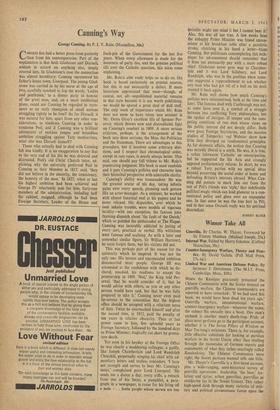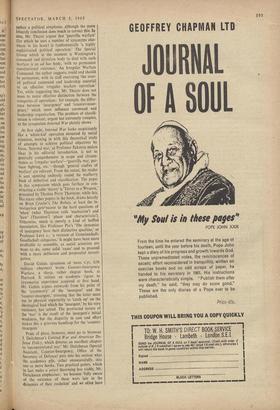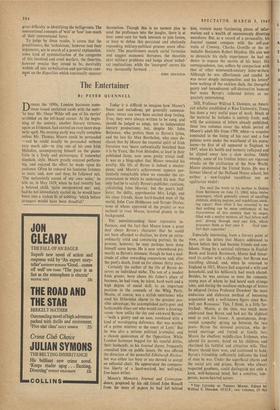Winner Take All
Guerrilla, By Charles. W. Thayer. Foreword by Macmillan, 50s.)
WHEN the Russians graciously presented the Chinese Communists with the Soviet manual on guerrilla warfare, the Chinese commanders are reported to have remarked: 'If we had used this book, we would have been dead ten years ago.' Guerrilla warfare, unconventional warfare, counter-insurgency warfare—whatever the name, the subject fits uneasily into a book. One man's ambush is another man's death-trap. Pride of place must perforce go to the participant account, whether it is The Seven Pillars of Wisdom or Mao Tse-tung's strictures. There is, for example, little effective substitute for looking at partisan warfare in the Soviet Union other than mulling through the mountains of German reports and assessmehts of what they rather snarlingly called Bandenkrieg. The Chinese Communists were right; the Soviet partisan manual tells one little.
Mr. Thayer's Gueriilla is a first-hand account, plus a wide-ranging, semi-historical survey of guerrilla operations: leadership, 'the base.' iso- lation and terror, urban guerrillas, guerrillas as auxiliaries (as in the Soviet Union). This rather
high-speed dash through many varieties of military and political circumstance forces upon the author a political simplisme, although the more leisurely conclusion does much to correct this. In sum, Mr. Thayer argues that 'guerrilla warfare' (for which he uses a number of synonyms else- where in his book) is fundamentally 'a highly sophisticated political operation.' The Special Group which at the moment is Washington's command and direction body to deal with such Warfare is an ad hoc body, 'with no permanent constitutional existence.' An Irregular Warfare Command, the author suggests, could and should be permanent, with its staff exercising 'the over- all political command and leadership essential to an effective irregular warfare operation.' Yet, while suggesting this, Mr. Thayer does not seem to make effective distinction between the categories of operations: for example, the differ- ence between 'insurgency' and 'counter-insur- gency,' which must influence command and leadership organisation. The problem of classifi- cation is relevant, urgent but extremely complex, as the symposium Internal War plainly shows.
At first sight, Internal War looks suspiciously like a 'whizz-kid' operation mounted by social scientists, moving in with this theoretical study of attempts to achieve political objectives by force. 'Internal war,' as Professor Eckstein makes clear in his editorial introduction, is not as generally comprehensive in scope and circum- stance as 'irregular warfare'—'guerrilla war, par- tisan fighting, etc.'—though 'general studies of Warfare' are relevant. From the outset, the reader is sent spinning endlessly round the mulberry bush of definition and classification. The paper in this symposium which goes furthest in con- structing a viable 'theory' is 'Terror as a Weapon,' Presented by Thomas Perry Thornton; while this, like many other papers in the book, draws heavily on Brian Crozier's The Rebels, at least the in- Vestigation getenearer to the hard questions of 'when' (what Thornton calls 'nucleation') and 'how' (Thornton s 'phase and characteristic'). Otherwise, much is merely a kind of baffled speculation, like Professor Pye's The dynamics of insurgency have their distinctive qualities,' or Professor Levy o.. 'a revision of Gemeinschaft- Gesellschaft categories.' It might have been more profitable to assemble, as social scientists are wont to do, some solid 'cases' and to proceed With a more deliberate and purposeful investi- gation.
David Galula (graduate of Saint Cyr, UN military observer) wrote Counter-Insurgency Warfare, a sharp, rather elegant book, at Harvard. It utilises an academic rigour to systematise experience acquired at first hand. Mr. Galula argues outwards from his point of the 'asymmetry' of the 'insurgent' and the 'counter-insurgent,' stressing that the latter must use its physical superiority to 'catch up' on the ideological lead which the 'insurgent,' by his very existence, has seized. The protracted nature of the 'war' is the result of the insurgent's initial Weakness, but the disparity in cost and effort makes this a grievous handicap for the 'counter- insurgent.'
Pride of place, however, must go to Seymour Deitchman's Limited War and American De- fense Policy, which devotes an excellent chapter to 'unconventional war.' Mr. Deitchman (Special Assistant, Counter-Insurgency, Office of the Secretary of Defense) puts into his section what the academics pile, rather unsuccessfully, into one or more books. Two practical points, which in fact make a priori theorising less viable, Mr. Deitchman emphasises: we become 'fully aware of the existence of these wars late in the dynamics of their evolution' and we often have
great difficulty in identifying the belligerents. The conventional concepts of 'win' or 'lose' lose much of their conventional force.
To judge by these results, it seems that the practitioners, the 'technicians,' however taut their arguments, are in search of a general explanation, some kind of systematisation of the categories of this involved and cruel warfare; the theorists, however precise they intend to be, inevitably wobble off into verbalisation and querulous com- ment on the disparities which continually uncover • themselves. Though this is no earnest plea to send the professors into the jungles, there is at least some case for both interests to join forces, at least to define this persistent and obviously expanding military-political process more effec- tively. The practitioners mouth social formulas and suggest economic therapies, the theorists skirt military problems and hedge about techni- cal implications, while the 'insurgent' carves his way incessantly forward. . . .
JOHN ERICKSON




































 Previous page
Previous page